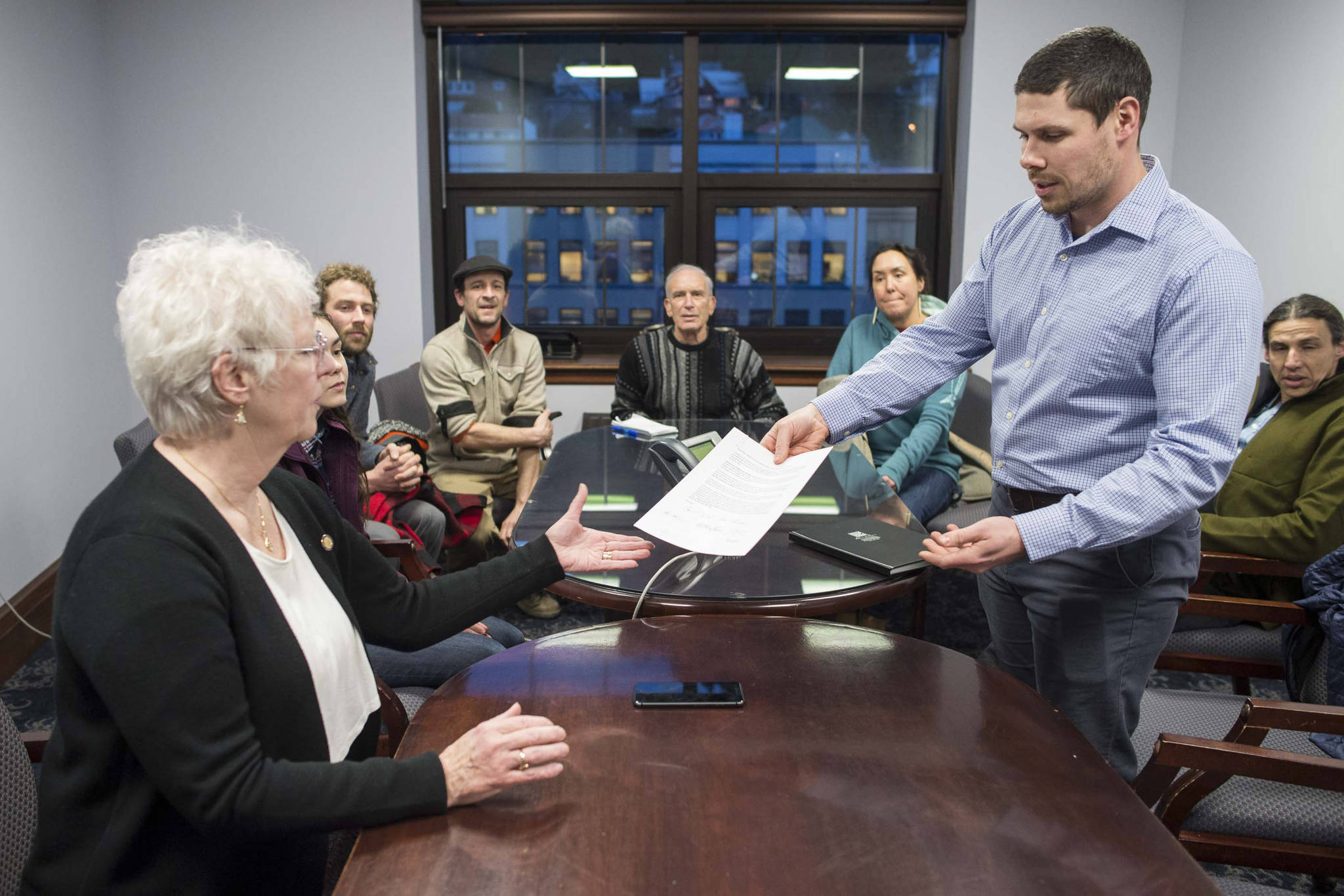Local fishermen and mining companies are picking sides this week over stringent new rules for construction on Alaska salmon habitat. One group did it through letters to a legislator. The other, with paper of a different sort: a $200,000 contribution.
The Stand for Salmon initiative and a similar bill known as House Bill 199 establish a new procedure for construction permits on fish habitat issued by Alaska Department of Fish and Game. It’s more complicated than existing permitting, mining companies say, and would be prohibitively expensive for construction projects across the state.
But fishermen say they simply want construction done responsibly. Without updates to a decades-old permitting law, commercial salmon fishing is put at risk by large oil, gas and mining projects.
Flanked by the group of seven other Juneau fishermen, gillnetter Sommers Cole gave HB 199 a stamp of approval Thursday when he delivered a letter to bill author Rep. Louise Stutes, R-Kodiak, on behalf of 200 fishermen. About 30 of the signers are Juneau fishermen, Cole told the Empire before his meeting with Stutes at the Capitol.
“Hopefully this will provide another tool that there will be fish in the future,” Cole said.
One of the problems with state law is that fish habitat isn’t properly cataloged, Stutes told the group. If regulators don’t know where the salmon streams are, they don’t know where to allow construction.
The bill and initiative get around this by doing away with a step requiring ADFG to establish habitat as fish-bearing, or anadromous. Instead, it assumes that an area is anadromous and requires permit applicants to establish that it’s not.
Fisherman Art Bloom, who signed the letter, said he’s seen how the process plays out in the Lower 48. Right now, construction projects are allowed to make up for damage to salmon habitat in areas away from their project. A construction project might cut off a salmon stream in one area, but would put money toward restoration in another, for instance.
HB 199 and Stand for Salmon initiative change this rule. Instead of being able to remediate damage to fish habitat somewhere else, construction companies would be required to do it where the construction occurs.
That setup didn’t work out well for salmon fishermen, Bloom said.
“It’s like death by 1,000 cuts. Current law allows damage to fish habitat,” he said.
Mike Satre, spokesperson for Juneau’s Hecla Greens Creek mine, said provisions like these would halt natural resource projects across the state, hurting Alaska’s economy by depriving Alaskans of jobs. It’s why Hecla made a $200,000 contribution on Jan. 24 to the Stand for Alaska, a group opposing HB 199 and the Stand for Salmon initiative.
Most of Greens Creek’s permits require updates every five years, Satre said. He fears if the Stand for Salmon initiative pass, Greens Creek might have trouble renewing those permits.
“There really is no greater threat to Alaska’s statewide economy than this initiative. Community development will be curtailed. The cost of permitting will be so high the projects will go off the map,” Satre said.
So how much more would construction companies have to pay in an already lengthy permitting process? Satre said it’s not about an additional cost. It would simply “not be possible” to pay completely for the requirements proposed.
It’s an issue of the definition of salmon habitat being too vague, he said.
“Most of Alaska would be considered anadromous fish habitat by the initiative and there are prohibitions in the initiative that specifically apply to mining operations as well as other large industrial operations that simply would not allow permits to be issued,” Satre said.
Greens Creek’s contribution puts Stand for Alaska at $485,177.54 in fundraising so far, according to
Mark Kiessling, General Manager for Juneau’s other mine, Kensington, told the Empire that Kensington stands with the Alaska Miners Association (AMA) in opposing the bill and ballot initiative. AMA Executive Director Deantha Crockett, who has spoken out against the bill and initiative before, was unable to provide a comment for this story.
In an email to the Empire, Crockett instead deferred to the Marleanna Hall, executive director of Resource Development Council for Alaska, Inc., a natural resource industry group. Hall said RDC is still reviewing changes made to HB 199 in the House Fisheries Committee meeting in January, but that the bill “goes too far.”
It’s not clear yet whether either HB 199 or the Stand for Salmon initiative will make it to a vote. The State of Alaska is currently challenging the ballot initiative in an appeal in court.
The ballot initiative will also need to pass a review by the Division of Elections, which has to sift through and verify each of the ballot’s 49,000 signatures. It needs only 32,127 to pass. Currently, Elections has verified more than 14,000 signatures. A final word on the ballots eligibility will come in mid-March, elections said when reached by phone Thursday.
HB 199, meanwhile, will make its way through House Fisheries Committee, which is scheduled to meet again next on Tuesday.
• Contact reporter Kevin Gullufsen at 523-2228 and kevin.gullufsen@juneauempire.com. Follow him on Twitter at @KevinGullufsen.

